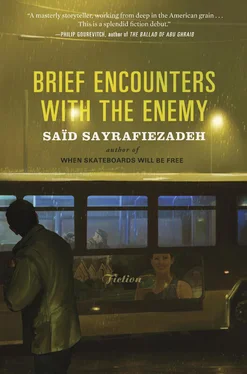We made out on the couch. The couch that I’d gotten from Walmart. I put my good hand straight up her sweater and she didn’t resist. Her stomach was smooth. Her bra was smooth. Her breasts were smooth. I thought about doing things with her, things I’d seen in videos, a number of which were hidden under the very couch we were sitting on. She must have been thinking things too, because she tried to pull my shirt straight over my head in one motion. That put an end to the proceedings. I pulled away and tucked my shirt back in. “I have to work in the morning” was what I said.
I drove her back home over the bridge. We had a good view of the factories all lit up.
“I should get a job down there,” I said.
“Like doing what?” she said.
“Like stoking the furnaces,” I said. What did I care? I pictured myself wearing overalls and a hard hat.
“You think you can stoke furnaces, Max?” she said.
“I can do whatever I set my mind to,” I said.
She didn’t say anything for a while. Then she said, “You’d be back at the supermarket in a week, begging to mop floors again.”
She was probably right.
She clicked open the visor and examined her face in the mirror. She took out a tube of lotion and put some on, rubbing it in small deliberate circles, clockwise and then counterclockwise. It smelled like lavender. I wondered if she’d stolen it. She used all sorts of lotions and potions, each one the one that was going to be the miracle cure.
“I think I’m beginning to see a change,” she said.
“I think so too,” I said.
“Really?” she said.
But I wasn’t so sure.
When I got to her house, she kissed me hard on the mouth. Then she reached in her pocket and handed me ten packets of ketchup that she’d taken from Burger King.
I said, “You know those are free, right?”
She got out of the car and her brother came out on the porch. He was holding a snowboard. “I’m on the snowboarding team,” he said.
When I got back home, I checked to see if she’d stolen anything. I checked everywhere, kitchen, bathroom, dresser drawers. I couldn’t find anything missing.
Halloween was coming. The days passed. The temperature rose. The snow melted and turned to slush. Everyone who had complained about the snow now complained about the slush. When the slush finally disappeared down the sewers, everyone complained about the cold. It was only October and it was going to be a winter full of complaint.
The war continued to hold steady, and we continued to lose ten to fifteen men a day, which wasn’t that many, all things considered. The experts said you had a better chance of dying in a swimming pool than dying in a war. The bodies came home in coffins draped with flags, as we held steady. Driving home at night, I’d pass the Halloween displays in front of the stores and homes. They were exceptionally imaginative and gruesome this year — bodies impaled, bodies decapitated, bodies on fire, along with the conventional artifacts of unease: pitchforks and black cats and spiderwebs. By late October, we were losing twenty-five men a day, which still wasn’t that many.
At the supermarket, business continued to boom. The deliveries increased to three a week and then four. In the afternoon, there’d be a line of eighteen-wheelers pulled up to the loading dock like cattle at the trough. Mr. Moskowitz ordered the guys on night turn to come in two hours earlier, but even that wasn’t good enough, even with Tom and Tim shouting like drill sergeants. In the morning, the back room would be filled with pallets of every kind of food imaginable, stacked floor to ceiling, so that I had to push my mop and bucket through narrow paths as if I were a mouse in a maze of cardboard skyscrapers. Everyone was trying to cut corners, trying to do things faster, including the stock clerks, who got into the habit of pulling their boxes out from the bottommost pallet and undermining the foundation, so that one afternoon, about thirty minutes before I was supposed to punch out, an entire skyscraper of produce collapsed. It sounded like an explosion when it fell. Two hundred pumpkins lay crushed on the floor like bodies in a disaster. I was the one who had to clean them up. I had to use two mops and a shovel. This time when Pink from coffee came past, he didn’t bother to make his usual joke about hardly working. His big fake watch told him he had five minutes left for his break. “Hardly hard?” I called after him. He didn’t think it was funny. Howie from deli walked by, reeking of aftershave and cheese and saying somberly, “I wish that was my head on the floor.” The cashiers passed, not saying hiiiiiiiiiiiiiiii, because they were working double shifts, and so were the butchers, and the bakers, and the baggers, and so was the man who collected the shopping carts in the parking lot whose hands were red from the cold. “That’s a safety violation” was what he said when he saw the mess. The only person who wasn’t having a problem with the workload was Ziggy, who was catching an average of three shoplifters a day and having the time of his life posting new photographs on the wall in the back room.
But on Halloween things changed for the better: we were on the move again, making progress toward the capital. That day, every thirty minutes, Mr. Moskowitz would click on the loudspeaker and announce, “Forty miles to go!” He’d shout like he was calling bingo. “Thirty-nine miles to go!” A great and spontaneous cry would rise up across the forty-eight aisles, people shouting and screaming, customers and employees alike. Everyone was happy and everyone was excited and everyone was breathing a sigh of relief. Thirty minutes later, the loudspeaker would click again. By the time I punched out, we had closed to within twenty-five miles.
Amanda’s parents were off at a fund-raiser or something, so it was up to us to accompany Oscar trick-or-treating. He was dressed up like a soldier in camouflage, a flak jacket, a plastic helmet, and a plastic bazooka. Since it was cold, he had to wear a coat and hat and scarf, so the only thing that made him look like a soldier was the bazooka. He didn’t seem to care. He wasn’t such a bad kid.
It was such a long walk between each big house that it took a while for us to get from one destination to the next. In the dark, you could hear people calling “trick or treat,” but you couldn’t see them, you could only see glowing pumpkins. Oscar held Amanda’s hand, and Amanda held my hand, and I imagined that this was what it might be like for me, twenty years in the future, walking with Amanda through some rich neighborhood on Halloween with our son or daughter. She probably wouldn’t marry me, though. She’d marry one of those successful guys with a college degree and a normal body. That was most likely what the future held in store for me, I thought.
“Bang bang!” Oscar said when the doors opened. In reply, the homeowners gave him generous handfuls of candy, which he didn’t mind sharing with Amanda and me.
At one point along the way, we stopped in the road to say hi to some of his little buddies from school. They stared at my empty sleeve and said, “What happened to your arm, mister?”
“It’s congenital,” I said.
“What’s that mean, mister?”
“It means it got shot off in the war.”
They liked this.
By the end of the night, we had ten pounds of candy.
“Can I stay up?” Oscar said when we got home. He wanted to count everything. He had chocolate all over his mouth.
“No,” Amanda told him. Then they screamed at each other. Then he went to bed. Then it was just the two of us.
It was quiet except for the ticking of the grandfather clock coming from somewhere deep within the house. We sat on the couch together. My good arm around her shoulder, her leg pressing against my leg.
Читать дальше












